
You’ve lived a pretty interesting life so far, so tell us a bit about yourself and what some of your previous chapters looked like.
I was born in western North Carolina and was lucky enough to spend most of my youth outside running around my grandmother’s farm or camping and riding bikes with Dad. Those days deeply influenced my decisions and have subsequently inspired me to create a life of adventurous curiosity and exploration. My grandmother once introduced me as the grandson that “doesn’t know what he wants to do when he grows up.” Although that was a cutting remark, it inspired me to analyze my choices and path while also fueling me to stay conscious of the connective tissue bridging my endeavors. As the years go by, it is undeniable to me that every job, project, and adventure I’ve been a part of has led to the next and those skills have culminated with my current career making and selling regenerative hemp and herbal medicine. Whether it was taking photos, business development, ranch work, graphic design, winemaking, or bartending, it is all relevant and connected.

You have a whole past with adventure trips and motorcycles that you don’t talk about much. What were some of the trips like that you used to go on?
My dad got me into motorcycles at an early age and I went on my first overnight with him and a few buddies in college. I caught the fever. It was an outlet for my intensity and energy. I felt I could find homeostasis at 90 mph on a backroad or pushing myself to ride all day on dirt. I've seen and felt most of the western US by motorcycle.
In 2010, I saved up some cash and rode a motorcycle through South America solo for 5 months. Two weeks into that trip I sold my GPS and just followed my gut. It was before Instagram, and brand sponsorships were still for the pros. I was free to go wherever, to speak with locals, soak in the culture and let myself be vulnerable to the adventure in the backwoods of Brazil, Argentina, Chile, and Uruguay. It changed me forever, it opened me up… Years later, I combined my passion for photography with motorcycles and shot for BMW in Mexico and Colombia. It is still my favorite way to roam the Earth.
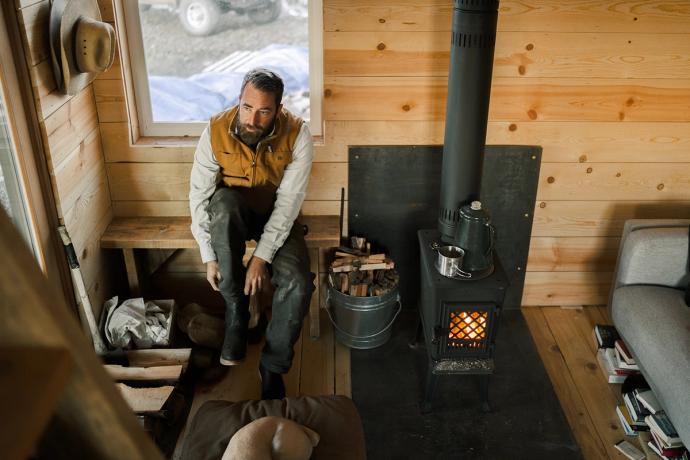
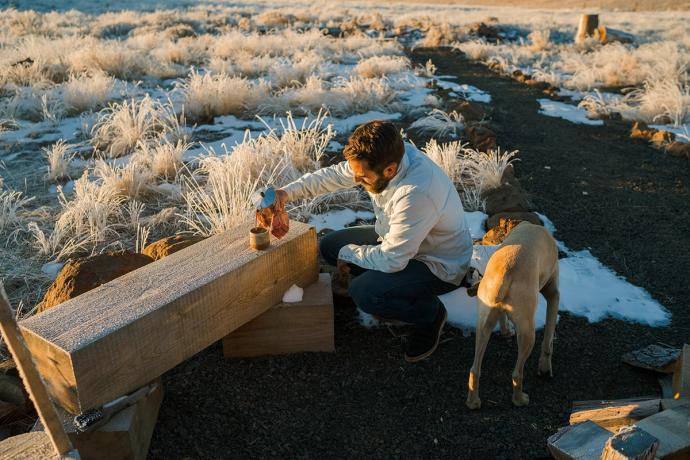
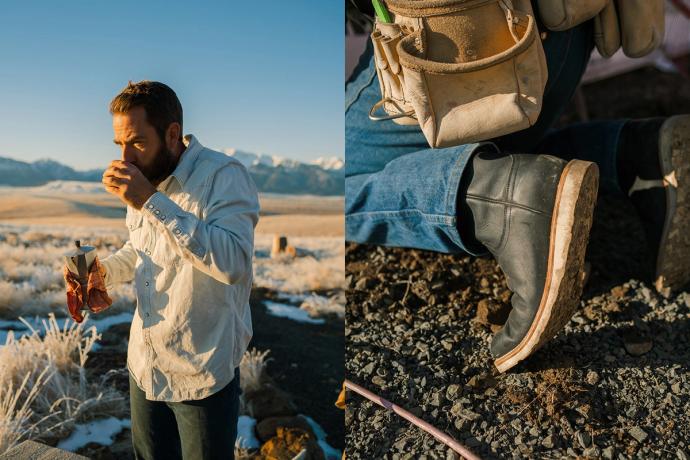
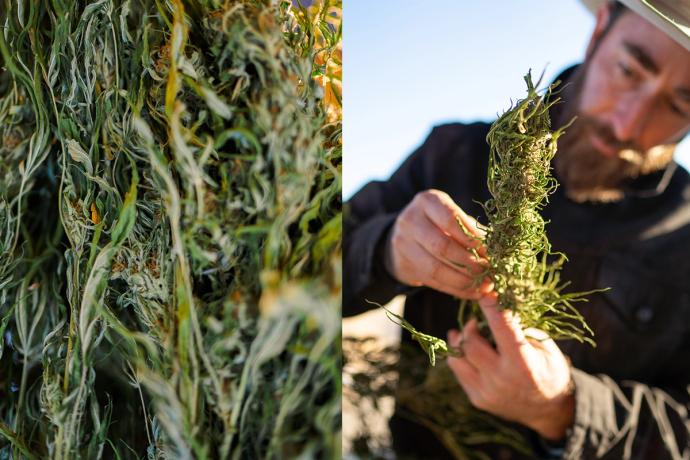
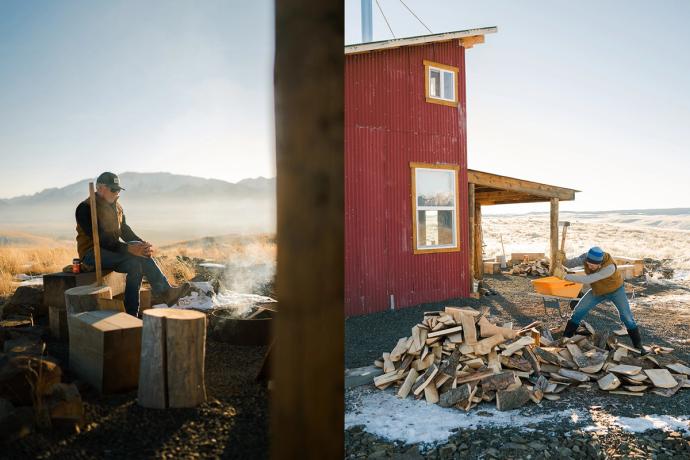
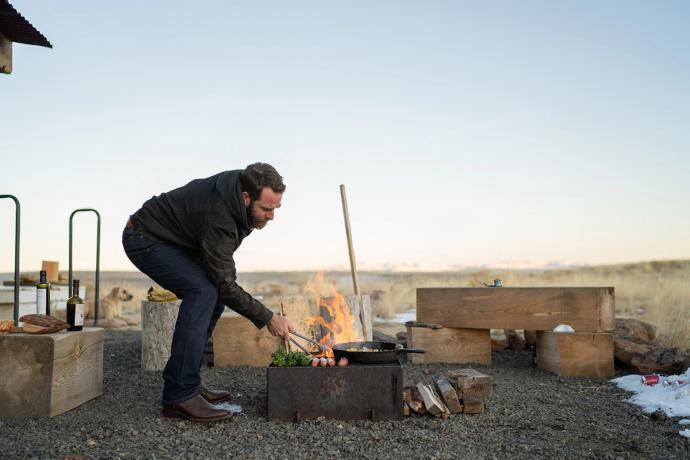
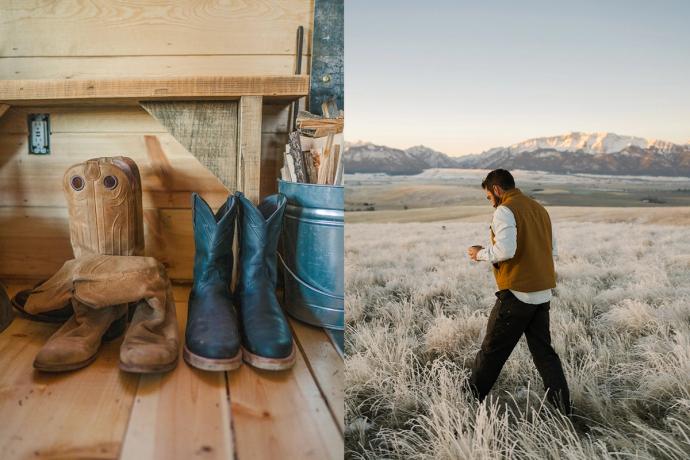
At what seemed like a whim, you moved to eastern Oregon to homestead on a piece of raw land. What drove this decision, and what has that journey been like? What are some of the challenges you’ve had to face in your pursuit of life on the open range?
In the middle of a deep dive on water issues and policies in the west while watching too much Black Mirror I felt compelled to take what little savings I had and throw it all down on land. I was nomadic at the time shooting photos for my agrarian and moto clients so I figured I would save the rent money and put it all towards the land. I obsessed over the maps and ended up buying the first piece of dirt I landed on. Didn’t know a soul in town but had a good feeling. Always trust the heart and gut, then the head. Looking back it seems a bit wild and reckless, but I’m eternally grateful I did it when I did as I couldn’t now.
It has been, alongside Onda, the most deeply humbling experience I’ve ever embarked on. Living in a tent and an old camper, moving food around coolers, cooking outside, bathing in the lake or rivers all sounds romantic, and it is, but it is also a deep caloric draw. It takes a lot of extra energy to maintain the centerline without the modern amenities most of us are accustomed to like water and power. I would never change it for the world, but it has whooped my ass. I hope to have a cabin finished sometime next year while still living fully off-grid. Then I’ll bring in livestock once the water infrastructure is complete.
But it is certainly a challenge to mitigate burnout from trying to do too much. There has been a lot of compromise, persistence, and ego death. Not compromising in a settling kind of way, but really trimming the fat and distractions. Realizing what really matters and focusing on that. I am always trying to keep that potency. As I get to know myself more deeply, I’ve realized my strengths and weaknesses which is in turn allowing me to minimize friction through acceptance and awareness. It is crucial for me to keep a hard pace and work hard, but try to have some energy to work on the land when I can. As much as I can, I’m pacing myself with some gentleness for the long game. What a blessing to have this experience though, I’m so grateful!

How did you get involved with ranching and farming? Tell us about the journey that led you down a more agricultural path.
My folks always grew food so my connection was intimate from the early years. Then during my teens and 20s my relationship with the natural world was more focused around recreation until I met David Mahaffey. This legend shot photos for Polaroid in the 70s after teaching photo and film at Harvard and kicking it with Andy Warhol. We were fast friends, and in 2010 he invited me to work with him on a wine harvest in Napa Valley. Well, truthfully I harassed him until he said I could join. Haha. But that persistence paid off as David opened my eyes up to dynamic living systems. He treated his backyard like a diversified ecosystem producing food for him and his wife. I learned about organic grape growing, woodworking, sales, distillation, and more. I then made my way to Colorado where I ran business development for Jack Rabbit Hill Biodynamic Farm producing the best damn spirits I've ever had. I worked for a few ranches and farms after that and when I started Onda, I was able to pull it all together.
Tell us about your company, Onda Wellness, and what the inspiration was to start healing folks.
Onda is the world's first biodynamic and verified regenerative hemp medicine on the planet, and I wouldn't have been able to dive into this experiment if it wasn’t for my agricultural endeavors. My senior high school thesis paper was on hemp some 20-odd years ago, so I'd say I was fated to work with this plant. So in 2016, after lots of testing and learning, I mixed a herbal blend, tea, and home-activated CBD oil together, and I hopped on a flight to Colorado for the holidays. During the flight, I was astonished at how good I felt. It was almost adaptogenic. I could read clearly, have a sharp conversation but somehow that airplane seat felt cozy for once. I thought to myself “this could really help people.”

A year prior I had a dream where my recently deceased friend told me I would start a business with her mother. Seemed super random at the time, but after that flight, it all clicked. I called Annie and asked her if she thought there was a future in CBD and she agreed. Then we started Onda.
We have so many encouraging anecdotes from customers that make all the hard work worth it. For example, there was a 10-year-old girl who was suffering from seizures and her mother told me that all the expensive medications were not working, but Onda was the only one that was helping her find relief from seizures. We get messages from folks telling us how they use Onda for job interviews or auditions to calm their nerves and how some folks can finally get the rest they have been looking for without harsh chemical medications.
What are some common misconceptions about CBD, or even about the power of regenerative agriculture?
I feel like with any product that comes from the Earth there are a lot of bad actors that tend to overprocess the plants, stripping it of its true nutrient potential and selling folks low-quality junk that does not work. If you think about every industry, there are super high-quality products and there are low-quality products. Often the highest quality goods are the least known because the producers are busy making the best stuff on the planet — free of investor influence — while the lower quality stuff gets the attention of the consumers with their shiny tactics. It is about priority. Do we spend money on lots of ads, TikTok, and catchy marketing, or do we pay our farmers top dollar and be unwavering in our quality standards!? Obviously the latter. That’s why we partner with Casad Family Farms. Our hemp is grown alongside herbs, veggies, flowers and among polycultures of livestock. The natural way.
This is ancient medicine (arguably one of the first plants to be cultivated) and we are a part of the reintroduction of this medicine post-prohibition. As the low-quality products and the less committed businesses fall away during the market’s regulation, Onda will be holding the line as a heritage hemp and herb brand.

With any evolution away from the industrial/conventional model there will be doubts and fears. Whether it is taking less ibuprofen for inflammation by using a clean, natural hemp medicine like Onda or shifting away from large, industrial monocrop models to more diversified regenerative farming models. It requires an open mind and commitment to look at models that are less extractive and focused on short-term gain for the benefit of human and planetary health. The most common question I hear in regard to the ability of regenerative ag. models to feed the planet are around scalability. I love how our pal Will Harris of White Oak Pastures responds by saying, “This isn't scalable but it's highly replicable.” So I think folks are asking the wrong question. Why would you want to scale something if you can create custom, tuned, regionally specific models?
I've worked on enough properties to see the effects of Biodynamic and regenerative agriculture. Like all good things it takes time, but it's always worth it.
Why is it important to support local farmers, especially certified organic or biodynamic ones?
When you are healthier you are happier. When you support organic, biodynamic, and regenerative farms you are typically ingesting foods and goods that have more nutrient density which in turn make you healthier. These types of farming also are working to make ecosystems stronger and more vital by building soil health, creating habitats, and not polluting waterways with toxic runoff, for example. Sure it might cost a little bit more but it's insurance for your future and that of your children.
Any closing thoughts?
Life is short, ditch the fear and follow your heart.

Interview by: Tyler Sharp, IG @tylersharpphoto
Photographer: Wes Walker, IG @southwes
Featuring Stephen Smith: @stephensmiiith / @onda.wellness